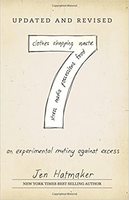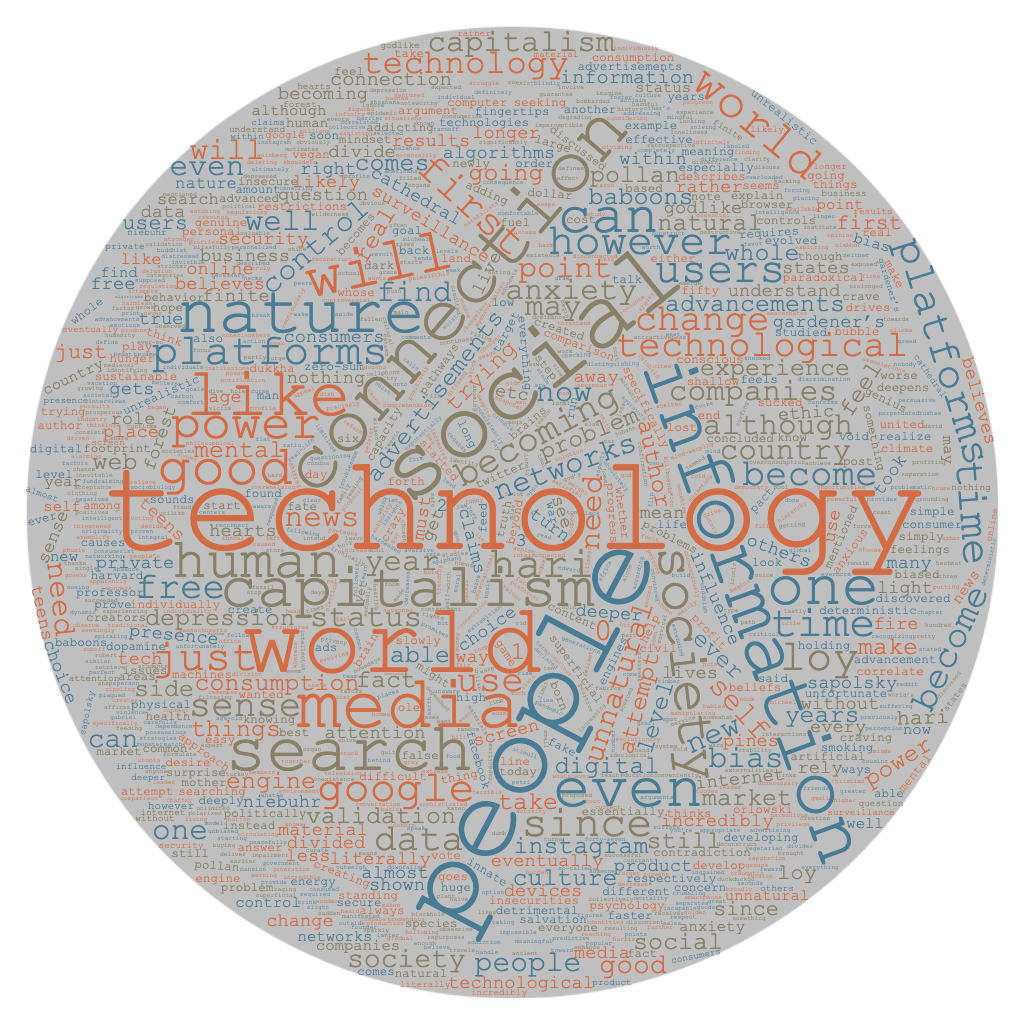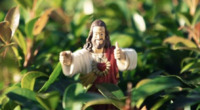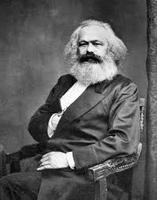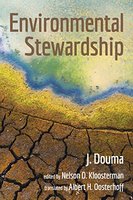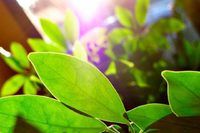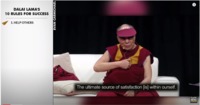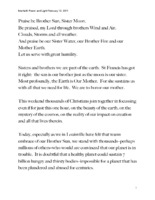Search
39 items
-
7: An Experimental Mutiny Against Excess
Overwhelmed by the excess in her own life, Jen Hatmaker and her family set out on a project they called “Seven.” Highlighting seven areas of excess, they committed to living a little more simply every month. Originally published in 2011 and updated in 2017, 7 has been utilized for book studies in many Christian faith communities. For those overwhelmed with the task of implementing creation care in their own lives, Hatmaker’s memoir tells of her family’s practical and faith inspired experiment. More information about Hatmaker’s project can be found on her blog. -
Dalai Lama Espouses Sustainability in Business
His Holiness the Dalai Lama recently spoke in Brussels to promote global responsibility in business and economics for the sake of social and environmental sustainability. His appearance was coordinated with the recent publication of Business as an Instrument for Societal Change: In Conversation with the Dalai Lama (https://www.routledge.com/go/greenleaf-publishing), a book by Sander Tideman. For more information about the Dalai Lama’s teachings on the environment, visit his website and browse his list of environmental speeches and messages (https://www.dalailama.com/messages/environment). -
6 Ways to Green Your Holiday
6 Ways to Green Your Holiday is a graphic made by the Sierra Club. It gives 6 easy ways make Christmas traditions more sustainable. To view the image, click below or *download* -
Creation Care Hack: Train Yourself to use Reusable Shopping Bags
Creation Care Hack: Train Yourself to use Reusable Shopping Bag is a post from Evangelical Environmental Network MOMS. The article discusses how using a reusable shopping bag is only easy if you make it a habit, which can be difficult. It then gives a few tips on how to make this sustainable practice a habit. The article also has a graphic on how plastic bags are killing the planet, which can be found below. The author finishes by saying, “If the 70% of Americans who identify as Christians practiced using less disposable plastic bags what a witness and difference that could make.” See additional attached media for an infographic (.jpg) for visual information on plastic bag use. -
12 Days of Christmas Recycling
12 Days of Christmas Recycling is an article from Evangelical Environmental Network about all the “stuff” that accumulates over Christmas. December is the highest month for landfill deposits with household waste increasing by 25% between Thanksgiving and Christmas. An average of 30 million Christmas Trees will end up in landfills and 4 million tons of wrapping paper and gift bags will be used. The article gives 12 ways to “reduce the overuse” and to move the focus of Christmas back to the birth of Jesus. -
Catholic Climate Covenant Earth Day Video
Catholic Climate Covenant has created their 2018 Earth Day video Beyond a Throwaway Culture. The focus of the video is the harm that comes from single-use disposable plastics - how it contributes to both land and marine pollution. -
Technological Takeover or Technological Makeover?
This chapter from the student-written book “Emerging Perspectives on Religion and Environmental Values in America” explores the recent and rapid development of technology and its impact on our environmental actions. It discusses trends of consumerism, social conflict, and disconnection. Below is the first paragraph of the chapter to introduce the discussion.
"Is it just me or does it feel like the whole world is going crazy? From a global pandemic, to a civil rights revolt, to talk about election fraud, it seems like everything is spiraling out of control and technology seems to be adding fuel to the fire. It feels as if technology is the invisible hand that controls us all on every level, individually and as a culture. As technological advancements push further, the concern for the problems perpetuated by them rises as well. I am not trying to be labeled as a 'Karen' of my generation, but technology is slowly eating away at our brains and degrading the fabrics that hold our society together." -
Sustainability Photo Contest
This RESTORExchange photo contest is being brought back from the pre-COVID era, and with an added collaboration with the Sustainability Institute. It's based around the question "What does sustainability look like?" This can include sustainability in environmental justice, technology, energy, lifestyle and wellbeing, society and culture, economy and politics, and any other context where you see sustainability in action. We want to see your perspectives and show all the different places that sustainability is practiced! Winning photos will be decided by a panel of judges (yet to be determined), and the top four photos will win a prize! First place will receive $400, second place will receive $300, third place will receive $200, and an honorable mention will receive $100. Submissions will be accepted through March 15, 2023. -
Cool Congregations
"The Cool Congregations Challenge, is an annual national contest to recognize 'Cool Congregations' that are becoming energy efficient and sustainable role models within their communities. The contest is brought to you by Interfaith Power & Light, a nonprofit organization inspiring and mobilizing people of faith and conscience to take bold and just action on climate. There are no fees to enter. Application period opens November 1 each year. Deadline for entries, December 15. Get ready to enter the Challenge!
Due to Covid the project eligibility window has been expanded again for 2024. Projects completed in 2021, 2022, and 2023 will be eligible to apply. Deadline Dec 15, 2023, awards announced in February 2024.
NEW! Electric Vehicle Leader category for congregations that have encouraged EV adoption. This category includes: EVs (Congregants and Staff) • Congregational EV Charging Stations • Outreach • Educating and Advocating for EVs. (Includes all-electric vehicles, plug-in hybrids and electric bikes. If your congregation is working on reducing transportation emission through public transportation or carpooling, apply to the Community Inspiration category.)" -
Advent Simplicity Challenge
"This Advent, commit to simplicity. In a season that can mistakenly be focused on gifts and consumption, explore ways to live simply as we hopefully prepare for the coming of Jesus and the restoration of the earth. This year, we’ll be mixing in new daily challenges, as well as accompanying PDFs for folks who prefer not to use the interactive calendar." -
Plastic Jesus: Real Faith in a Synthetic World
"Everywhere we look in our culture you will find plastic. One place where you will not find plastic, however, is in the Bible.
This resource is designed to help congregations think more deeply about the ways that plastics impact our lives and God's creation. It is also intended to equip people of faith to take actions to address this epidemic in faithful and practical ways.
Download this resource to find stories of individuals and communities making a positive impact, sermon starters to spark meaningful discussions in your church, worship resources to unite in prayer and reflection, and actionable steps to address the plastic crisis in your life, community and, our world." -
Extra Time
"Let's recycle our garbage to give our planet extra time". Taken by Mohamed Dhaouadi. Submitted to the RESTORExchange Sustainability Photo Contest. -
Resources for Preaching & Speaking on Climate Change
The resource gives information for preachers and other religious figures to use when talking about climate change. It starts by giving reasons for preaching about climate change and why it is important for us now and in the future. It also gives facts from scientists on the climate which mentions the aspects of climate change such as the causes and effects on the environment, and what humans can do to help. The article then gives biblical themes related to climate change and also gives advice for religious leaders to overcome possible barriers when preaching. -
What Karl Marx has to say about today's environmental problems
Ted Benton, a Professor of Sociology at the University of Essex, writes about how Marx's theories can be applied to modern environmental issues such as climate change. He talks about how Marx's ideas about capitalism relate to current exploitation of nature, and specifically about soil degradation which was an issue during the 1860s when Marx was alive. He also includes problematic parts of Marx's attitudes towards nature, such as his praise of increased productivity of land that may have inspired Stalin. -
Environmental Stewardship
This book goes into detail about how the Christian religion goes about environmental stewardship. They look at how bible passages talk about preserving the Earth and the morals we should have surrounding it. It dives deep into how science interacts with human interaction with the Earth and the damage that we have done to Earth, as well as what we should do to correct ourselves. -
Seeing true nature: Buddhism and the environment
John Worthington-Hill describes how Buddhism can encourage environmental awareness and sustainability. Embracing individuality is our disconnection from the natural world. In order to live in unity with the earth, we must find the 'middle way' (a buddhist morality based on self-discipline). "Self-centeredness is the great illness from which all imbalance, insensitivity and abuse ultimately stem – an illness directly linked to the Buddha’s ‘three poisons of greed, ill-will and delusion’. These poisonous mentalities seep into the collective consciousness and are instilled in the norms and structures of culture and society, helping to direct how politics and economics deal with the environment." "Environmental destruction is therefore an outer manifestation of an inner affliction. If our thoughts are polluted, then our actions will be polluted too, and so will their consequences." -
Himalayan Institute
Founded in 1969 by the great teacher and humanitarian, Swami Rama, the Himalayan Institute acts on the basis of yoga tradition and Eastern spirituality. Through the living connection to an ancient wisdom tradition of the Himalayan Masters, and the guidance of spiritual head Pandit Rajmani Tigunait, the Himalayan Institute seeks to serve communities across the globe of those who seek to live their spiritual values. The institute provides resources for anyone seeking spiritual wellness such as yoga and meditation training, local retreats and seminars, and domestic and international excursions, frequently taking the form of a trek through the Himalayas. The Himalayan Institute strives for sustainable living in partnership with the community in Honesdale and also in their projects in India and Africa- providing sustainable living, jobs, and farming in several different communities. -
International Network for Conservation and Religion
The International Network for Conservation and Religion gathers information regarding conservation and religion to guide its users on how to act with greater care towards the environment. Groups are able to create plans for their future interactions with the environment in connection to their religion. The growing website allows users to easily share ideas within INCR and elsewhere. -
The Wisdom of Houseplants
There has been a recent rise in the popularity of houseplants. This resource relates aspects of tending to houseplants to different ways you can be more mindful about your own life. Through caring for the houseplants, this web page reminds you to be adaptable, to be patient, and to expand yourself. While also additionally reminding the reader that letting go and paying attention to your physical health are both key in positive personal growth. -
Dalai Lama's 10 Rules for Success
This video is the Dalai Lama speaking of how to calm ones mind as well as how to connect with the universe through inter connection of self and creation. -
Brother Sun, Sister Moon
Pastor Michael Mernagh delivered this sermon that relates the planets and elements to family members. He does this to encourage his audience to treat the environment as family. Father Michael passionately describes how humans have been harming the environment and advocates for his audience to change their attitude in order to make better choices. -
Muslims for Progressive Values
MPV (Muslims for Progressive Values) establishes and nurtures vibrant progressive Muslim communities. We do this by creating opportunities for religious discourse, volunteer and community activities, and cultural events bringing together the arts, spirituality, and social activism.
Since our inception, we have secured DPI and ECOSOC Special Consultative Status at the U.N., and a founding member of the Alliance of Inclusive Muslims, or AIM, an umbrella organization spanning 13 countries and 17 cities.
MPV is a progressive Muslim voice on contemporary issues. We voice our perspectives with policy briefs, by participating in civil discourse, engaging with the media and government entities, and by partnering with both Muslim and non-Muslim progressive organizations.
MPV promotes theologically-sound frameworks for Islamic liberalism. We seek to reinvigorate the Islamic tradition of ijtihad (critical engagement and interpretation of sacred texts) and intellectual discourse. We do this by collaborating with religious scholars and developing position papers on theological issues that are accessible to a wide audience.
Muslims for Progressive Values has been in existence since 2007. Quietly and diligently, we have been building our progressive community, one city at a time, and now one country at a time. Since its inception, MPV has expanded to include communities in Los Angeles, San Francisco, Washington DC, Atlanta, Columbus (OH), New York, Chicago, Boston, Minnesota and The Netherlands. -
Green Umbrella Impact Team: Faith Communities Go Green
MISSION: Partnering with religious communities to create a more sustainable and equitable future for all by mobilizing their moral voice to reduce the risk of catastrophic climate change.
VISION: Religious communities collaborating to integrate care for creation in their lives and society. -
The Story of Stuff (Documentary)
The Story of Stuff is a short animated documentary about the lifecycle of material goods. The documentary is critical of excessive consumerism and promotes sustainability.
Filmmaker Annie Leonard wrote and narrated the film, which was funded by Tides Foundation, Funders Workgroup for Sustainable Production and Consumption, Free Range Studios and other foundations. Free Range Studios also produced the documentary, which was first launched online on December 4, 2007.
The documentary is used in elementary schools, arts programs, and economics classes as well as places of worship and corporate sustainability trainings. By February 2009, it had been seen in 228 countries and territories. According to the Los Angeles Times as of July 2010, the film had been translated into 15 languages and had been viewed by over 12 million people. -
The Story of Stuff Project
The Story of Stuff Project is:
Community-Minded
Our global, online Community of over 1 million Changemakers includes parents, community leaders, teachers and students, people of faith, entrepreneurs, scientists and others interested in creating a more healthy and just world. The interests and needs of our Community members deeply informs our work, and your passion and support enable our small team to have an outsized impact.
Solutions-Focused
We know all about the problems — from climate change to income inequality to political corruption. Our movies and other media focus instead on the big, exciting innovations driving the environmental and social change we need, as well as the little things individuals and communities can do to make a difference. We call it ‘Growing Solutions’.
Action-Oriented
We believe that dramatically increasing civic participation — not just refining our consumer choices — is the key to unlocking the profound challenges we face. Our four-week Citizen Muscle Boot Camp program equips participants with the basic skills they need to organize and lead a local project. And our campaigns provide diverse, engaging opportunities for our Community members to get involved, from the global level down to where they live and work.

